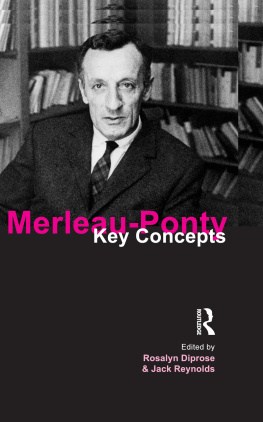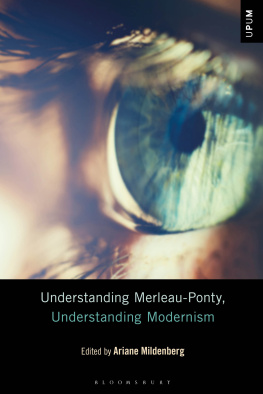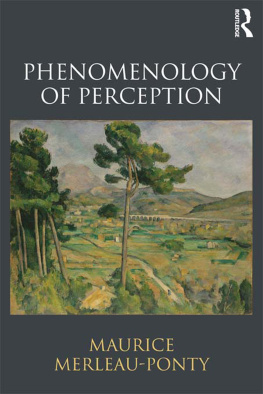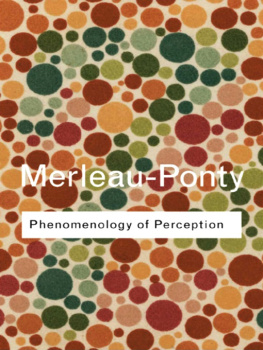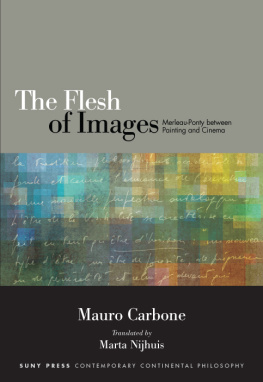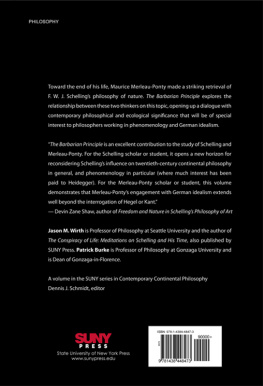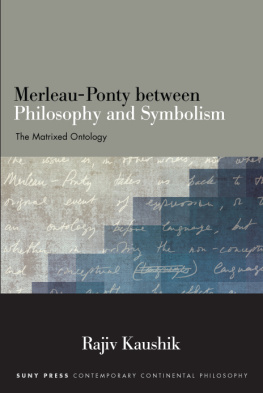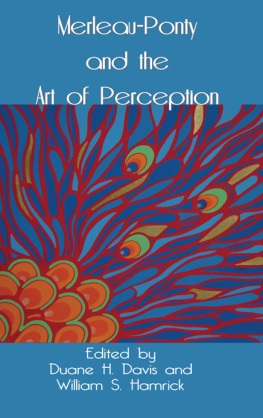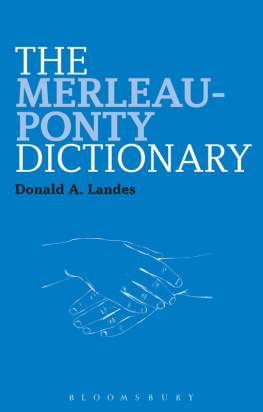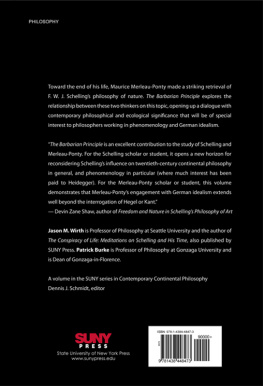Diprose Rosalyn - Merleau-Ponty: Key Concepts
Here you can read online Diprose Rosalyn - Merleau-Ponty: Key Concepts full text of the book (entire story) in english for free. Download pdf and epub, get meaning, cover and reviews about this ebook. publisher: Taylor and Francis, genre: Science. Description of the work, (preface) as well as reviews are available. Best literature library LitArk.com created for fans of good reading and offers a wide selection of genres:
Romance novel
Science fiction
Adventure
Detective
Science
History
Home and family
Prose
Art
Politics
Computer
Non-fiction
Religion
Business
Children
Humor
Choose a favorite category and find really read worthwhile books. Enjoy immersion in the world of imagination, feel the emotions of the characters or learn something new for yourself, make an fascinating discovery.
- Book:Merleau-Ponty: Key Concepts
- Author:
- Publisher:Taylor and Francis
- Genre:
- Rating:4 / 5
- Favourites:Add to favourites
- Your mark:
- 80
- 1
- 2
- 3
- 4
- 5
Merleau-Ponty: Key Concepts: summary, description and annotation
We offer to read an annotation, description, summary or preface (depends on what the author of the book "Merleau-Ponty: Key Concepts" wrote himself). If you haven't found the necessary information about the book — write in the comments, we will try to find it.
Merleau-Ponty: Key Concepts — read online for free the complete book (whole text) full work
Below is the text of the book, divided by pages. System saving the place of the last page read, allows you to conveniently read the book "Merleau-Ponty: Key Concepts" online for free, without having to search again every time where you left off. Put a bookmark, and you can go to the page where you finished reading at any time.
Font size:
Interval:
Bookmark:

Merleau-Ponty
Key Concepts
Theodore Adorno: Key Concepts
Edited by Deborah Cook
Gilles Deleuze: Key Concepts
Edited by Charles J. Stivale
Merleau-Ponty: Key Concepts
Edited by Rosalyn Diprose and Jack Reynolds
Pierre Bourdieu: Key Concepts
Edited by Michael Grenfell
Michel Foucault: Key Concepts
Edited by Dianna Taylor
Martin Heidegger: Key Concepts
Edited by Bret Davis
Wittgenstein: Key Concepts
Edited by Kelly Dean Jolley
Key Concepts
Edited by
Rosalyn Diprose and Jack Reynolds

First published in 2008 by Acumen
Published 2014 by Routledge
2 Park Square, Milton Park, Abingdon, Oxon OX14 4RN
711 Third Avenue, New York, NY 10017, USA
Routledge is an imprint of the Taylor & Francis Group, an informa business
Editorial matter and selection, 2008 Rosalyn Diprose and Jack Reynolds. Individual contributions, the contributors.
This book is copyright under the Berne Convention.
No reproduction without permission.
All rights reserved. No part of this book may be reprinted or reproduced or utilised in any form or by any electronic, mechanical, or other means, now known or hereafter invented, including photocopying and recording, or in any information storage or retrieval system, without permission in writing from the publishers.
Notices
Practitioners and researchers must always rely on their own experience and knowledge in evaluating and using any information, methods, compounds, or experiments described herein. In using such information or methods they should be mindful of their own safety and the safety of others, including parties for whom they have a professional responsibility.
To the fullest extent of the law, neither the Publisher nor the authors, contributors, or editors, assume any liability for any injury and/or damage to persons or property as a matter of products liability, negligence or otherwise, or from any use or operation of any methods, products, instructions, or ideas contained in the material herein.
ISBN: 978-1-84465-115-3 (hardcover)
ISBN: 978-1-84465-116-0 (paperback)
British Library Cataloguing-in-Publication Data
A catalogue record for this book is available from the British Library.
Typeset by Graphicraft Limited, Hong Kong
| Jack Reynolds |
| Rosalyn Diprose |
| Ted Toadvine |
| Thomas Busch |
| Taylor Carman |
| Beata Stawarska |
| Sonia Kruks |
| Diana Coole |
| Hugh J. Silverman |
| David Morris |
| David R. Cerbone |
| Gail Weiss |
| Michael Sanders |
| Harry Adams |
| Suzanne L. Cataldi |
| Scott Churchill |
| Fred Evans |
| Ann Murphy |
| Shaun Gallagher |
| Philipa Rothfield |
| Nick Crossley |
Rosalyn Diprose is Associate Professor of Philosophy at the University of New South Wales. She is the author of Corporeal Generosity: On Giving with Nietzsche, Merleau-Ponty, and Levinas (2002), The Bodies of Women: Ethics, Embodiment and Sexual Difference (1994), many chapters and journal articles, and co-editor of Cartographies: Poststructuralism and the Mapping of Bodies and Spaces (1991).
Jack Reynolds is Lecturer in Philosophy at La Trobe University. He is the author of Merleau-Ponty and Derrida: Intertwining Embodiment and Alterity (2004), Understanding Existentialism (Acumen, 2005), and multiple journal articles on the relation between Merleau-Ponty and philosophers including Levinas, Derrida and Deleuze.
Harry Adams is Assistant Professor of Philosophy at Prairie View A & M University. He is a moral and political philosopher and an emerging Merleau-Ponty scholar whose publications include Merleau-Ponty and the Advent of Meaning: From Consummate Reciprocity to Ambiguous Reversibility, in Continental Philosophy Review (2001).
Thomas Busch is Professor of Philosophy at Villanova University. He is a leading scholar in Merleau-Ponty studies and existentialism. His books include: Circulating Being: From Embodiment to Incorporation (1999), The Power of Consciousness and the Force of Circumstances in Sartres Philosophy (1990), and Merleau-Ponty, Hermeneutics and Postmodernism (co-editor, 1992).
Taylor Carman is Professor of Philosophy at Barnard College, Columbia University. He has published numerous articles on topics in phenomenology, including Merleau-Pontys philosophy. He is author of Heideggers Analytic: Interpretation, Discourse, and Authenticity in Being And Time (2003), Merleau-Ponty (2008) and co-editor of The Cambridge Companion to Merleau-Ponty (2004).
Suzanne L. Cataldi is Professor of Philosophy at Southern Illinois University. She has published numerous papers utilizing Merleau-Pontys philosophy and is well known for her detailed study of emotion and affectivity in Emotion, Depth, and Flesh: A Study of Sensitive Space: Reflections on Merleau-Pontys Philosophy of Embodiment (1993). She is also co-editor of Merleau-Ponty and Environmental Philosophy (2007).
David R. Cerbone is Associate Professor of Philosophy at West Virginia University. He is the author of Understanding Phenomenology (Acumen, 2006) and multiple journal articles on Heidegger, Merleau-Ponty, perception, and Daniel Dennett.
Scott Churchill is Professor of Psychology at the University of Dallas. He is the author of numerous articles on phenomenology, gestural communication, sexuality and second-person perspectivity, often drawing on the philosophy of Merleau-Ponty. He is editor of The Humanistic Psychologist and studies interspecies communications with bonobos at the Fort Worth Zoo.
Diana Coole is Professor of Political and Social Theory at Birkbeck College, University of London. She has extensive publications in the fields of modern political and social theory and continental political philosophy, which include several essays on Merleau-Pontys political philosophy. Her books include Negativity and Politics: Dionysus and Dialectics from Kant to Poststructuralism (2000) and Merleau-Ponty and Modern Politics after Anti-Humanism (2007).
Nick Crossley is Professor of Sociology at the University of Manchester. He has been at the forefront of bringing Merleau-Pontys philosophy to bear on sociology and critical social theory. His books include: The Social Body: Habit, Identity and Desire (2001), which draws on the work of Gilbert Ryle and Merleau-Ponty, Intersubjectivity: The Fabric of Social Becoming (1996), The Politics of Subjectivity: Between Foucault and Merleau-Ponty (1994) and Reflexions in the Flesh: The Body in Late Modernity (forthcoming).
Fred Evans is Professor of Philosophy at Duquesne University. He has numerous publications on Merleau-Pontys philosophy, which are unique in the way they intersect with philosophy of psychology, language and technology. He has chapters on Merleau-Ponty in his books, Psychology and Nihilism: A Genealogical Critique of the Computational Model of Mind (1993) and The Multi-Voiced Body: Society, Communication, and the Age of Diversity (forthcoming), and is co-editor of Chiasms: Merleau-Pontys Notion of Flesh (2000).
Shaun Gallagher is Professor of Philosophy at the University of Central Florida and Research Professor of Philosophy and Cognitive Science at the University of Hertfordshire. He has led the way in bringing Merleau-Pontys concepts to philosophy of mind, psychology and cognitive neuroscience. His most recent book, How the Body Shapes the Mind (2005), is a detailed study of this topic. He is also author of The Inordinance of Time (1998), co-author of The Phenomenological Mind (forthcoming) and co-editor of Ipseity and Alterity: Interdisciplinary Approaches to Intersubjectivity (2004), and Merleau-Ponty, Hermeneutics, and Postmodernism (1992).
Font size:
Interval:
Bookmark:
Similar books «Merleau-Ponty: Key Concepts»
Look at similar books to Merleau-Ponty: Key Concepts. We have selected literature similar in name and meaning in the hope of providing readers with more options to find new, interesting, not yet read works.
Discussion, reviews of the book Merleau-Ponty: Key Concepts and just readers' own opinions. Leave your comments, write what you think about the work, its meaning or the main characters. Specify what exactly you liked and what you didn't like, and why you think so.

